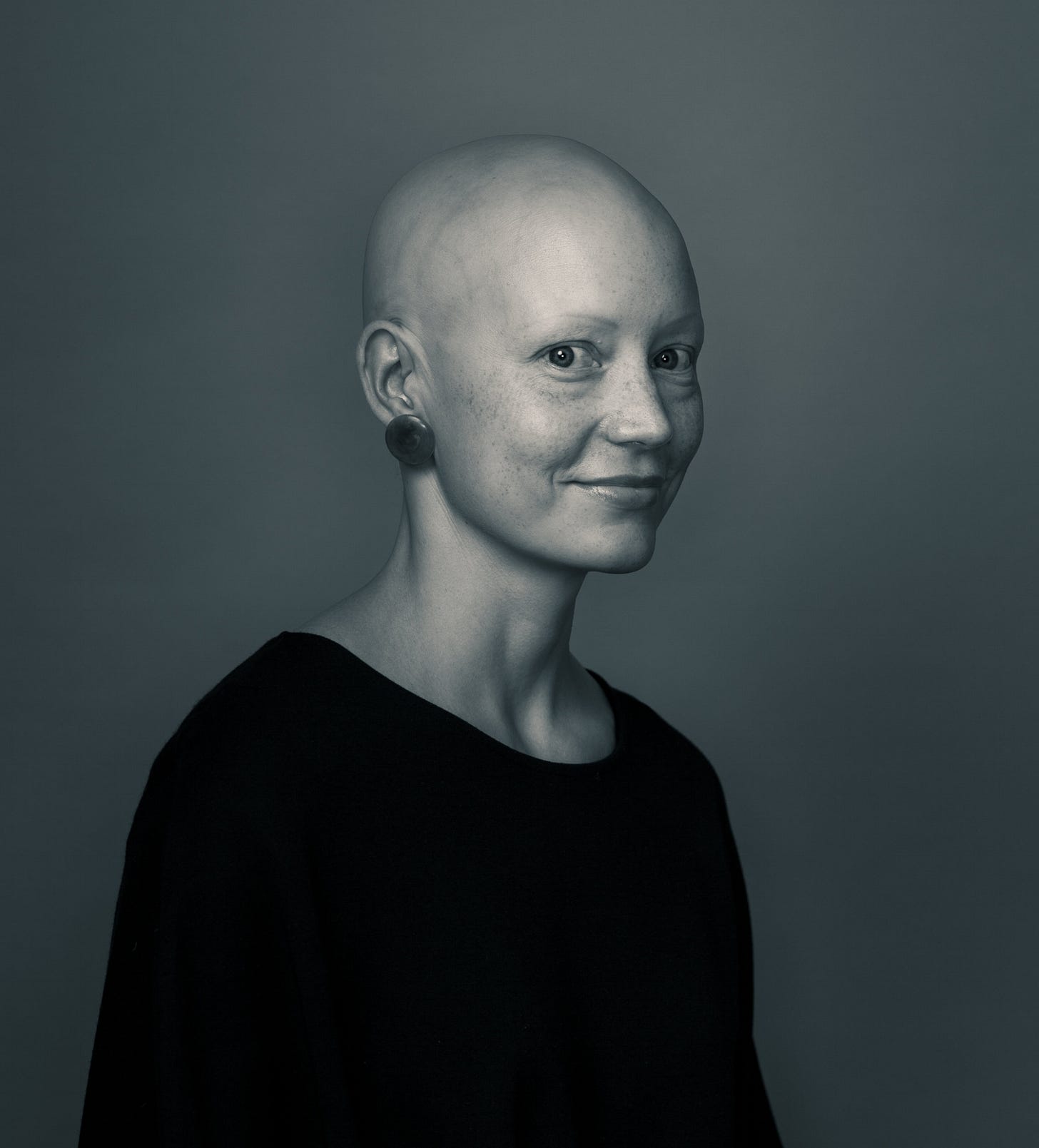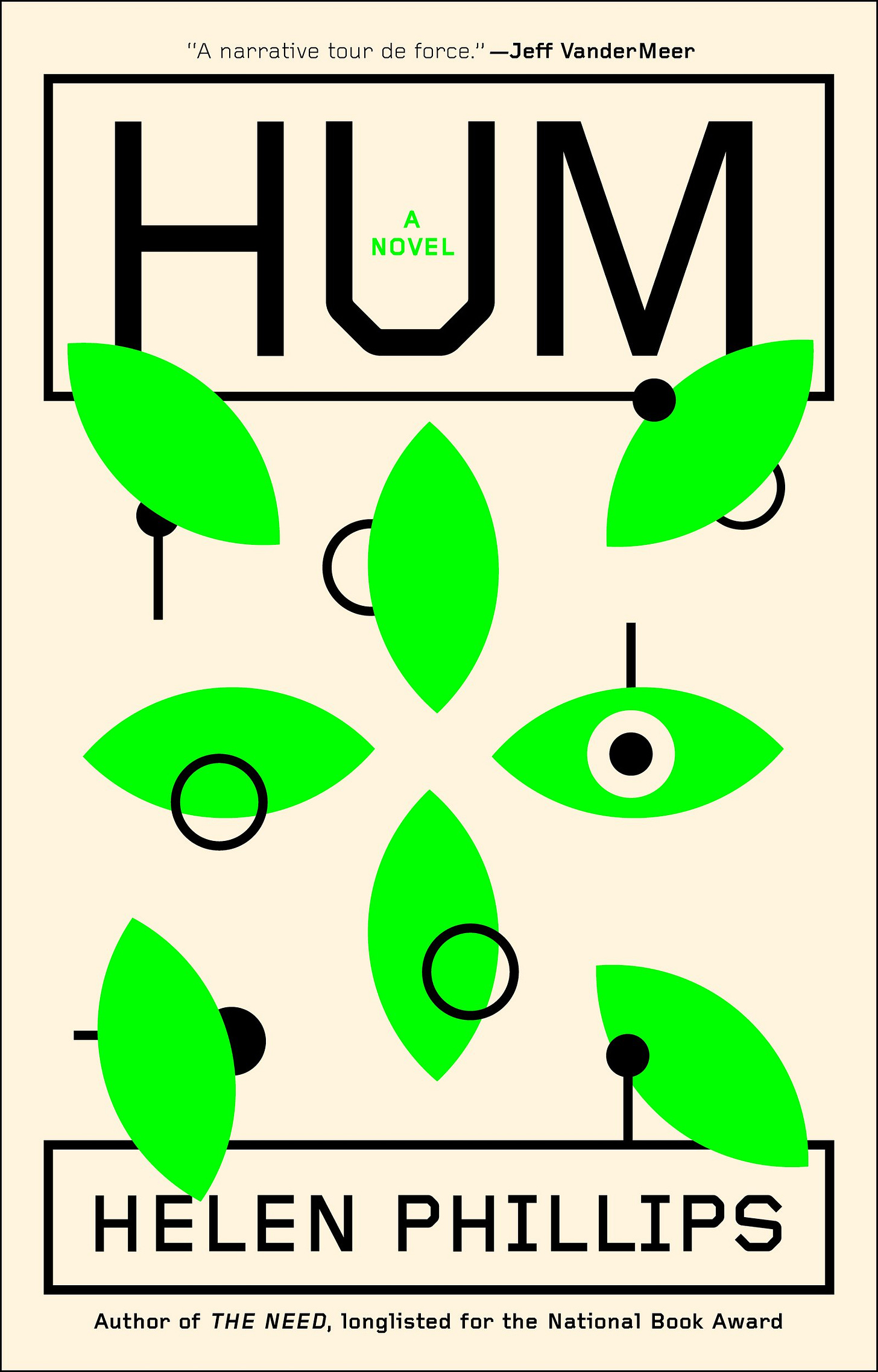'Ever easier to write in the dystopian vein'
5 questions for novelist Helen Phillips
Sometimes the best way to engage with the darker forces in our world is by wrestling with them in literature or art. Sure, we could listen to a podcast about artificial intelligence, or read an article about the ways in which social media is ruining our attentions spans, but honestly, we’ve probably already done that and it’s hard to feel any more emotionally prepared for what’s ahead.
In contrast, reading Helen Phillips new novel, HUM, is the kind of reckoning that works on and within you. It brings you into the emotional life of a character and then helps you look at a near world through her eyes. Somehow it’s the right amount of intimacy and distance all at once. Or at least that’s how I experienced this heart wrenching, propulsive, exquisitely short novel. Meet Helen, the one who wrote it…
Courtney Martin: A couple of my artist friends and I have an ongoing dialogue, mostly taking place on hikes, about how it seems like more men than women write “theory of everything” kind of novels. The book that set this all off was Overstory by Richard Powers. In some ways HUM is kind of a “theory of everything” novel–AI, climate change, the domestic sphere, labor and late stage capitalism etc. Did you ever feel like it was getting too big, too ambitious, and, if so, how did you answer that fear to keep going?
Helen Phillips: It’s interesting and exciting to me that you would categorize Hum as a “theory of everything” novel. When I set out to write the book, I was compelled (as I so often am) by my anxieties. Those anxieties—which I experience both as a writer and as a mother—included climate change, artificial intelligence, surveillance, and the future that we are creating. Writing is a way for me to conjure, confront, explore, and process those anxieties. At the same time, I wanted Hum to be a very intimate story about a family, about the smallest interactions and what it looks like to connect in a meaningful way with the people we love. I did, at times, feel overwhelmed amid all the research I was doing for the book (it has many pages of endnotes), but mainly I stayed moored in the family dynamics.
You write about the ways in which technology, particularly phones and watches, shape the emotional architecture of our domestic sphere in such a familiar, haunting way. Were you influenced by the big public conversation about The Anxious Generation and where do you come out on that in your own parenting?
I have yet to read The Anxious Generation (though it is high on my to-read list in preparation for writing my next novel), but all of these questions are very front of mind for me as the parent of a 12-year-old and 9-year-old. An unexpected guest has shoved its way into our homes, into our most intimate domestic spaces—the internet, social media, all these devices that connect and expose us to the whole simmering world.
As Vivek H. Murthy, Surgeon General of the U.S., recently noted in a New York Times essay, parents are offered basically no guidance on how best to deal with this: “There is no seatbelt for parents to click, no helmet to snap in place, no assurance that trusted experts have investigated and ensured that these platforms are safe for our kids” (“Surgeon General: Why I’m Calling for a Warning Label on Social Media Platforms,” June 17, 2024).
The scientific research can’t keep ahead of the technological innovation. So for each family it can feel like reinventing the wheel. My husband and I have tried to be deliberate and thoughtful in how we’ve introduced screens and phones into our children’s lives, but especially during the pandemic (when I wrote much of Hum), it felt absurd and exhausting to try to police all screentime. But, obviously not all internet content is created equal, and we’ve tried to steer them toward cool content (longtime favorites include neal.fun, code.org, MinuteEarth on youtube, and the show Sarah & Duck).
When my daughter started to ask for a phone at the end of sixth grade, I told her to write a contract that would enable me to feel good about giving her a phone. She did so (no social media; no phone after 8:30pm; no becoming a phone zombie; etc.), I added an addendum, we all signed, she got a phone, and it’s been working out much better than I expected. Perhaps most importantly, we try to spend as much time as possible with the kids doing non-screen things that feel better than staring at a screen. Long walks, playing with the dog, listening to music, dancing, seeing friends, dinner table conversation.
Reading HUM was dark, so I can only imagine writing it was pretty dark. What was your emotional experience of wading into such apocalyptic waters? Did you have to take breaks to preserve your mental health?
It’s actually the opposite experience! The dark thoughts and apocalyptic images already exist inside me, so it’s cathartic to shape them on the page and give them language. As I write, I’m seeking a way to share these visions and feelings, and to eventually learn what others are thinking about these things. Yes, the world of Hum is bleak, but writing the book was a quest for hope—for my protagonist May, and for me as a writer and as a mother. Which leads me to your next question…
Do you have a specific hope for this book and what it does in the world, and if so, what is it?
When I was developing the concept for Hum, I understood that it would be set in the near-future in a grimmer version of our current world, so in that sense I knew it had to be a dystopian story. At the same time, I gave myself a specific challenge (as I often do when writing): the book couldn’t be only dystopian. It becomes ever easier to write in the dystopian vein as our world moves more in that direction, and I needed the process of writing the book to also be a process of seeking hope.
Across multiple interviews I conducted when I was researching the book, my interviewees said that the main thing that gives them hope is collective action. The ending of the book, and the connection the family finds, is a gesture toward that.
I also hope the evolution of the hum’s character provides some ideas about how we might live alongside AI—what if our AI knew when to remove itself from our most human moments of connection? What if AI wasn’t beholden to a corporate agenda?
My dream is that Hum might contribute to the conversation about how we as a society could develop more thoughtfulness around how we nurture our connections to one another and to the natural world, and how we can use the miraculous technological tools at our disposal to nourish human community and creativity rather than to control, manipulate, isolate, and shame.
You’re a teacher now (at Brooklyn College, where I once taught as well!). What do you see younger writers gravitating towards these days in terms of topics and/or style that really excites you?
I love the Brooklyn College connection! I’ve been teaching there since 2006. What I’ve noticed most since the pandemic is a greater willingness to be emotional and vulnerable and authentic, both on the page and in the classroom. The mere fact of sitting in a circle with other people to talk about reading and writing feels almost sacred to me, more so now than ever before.
We donated to Friendship Bridge in honor of Helen’s labor, which provides microfinance, education, and preventive health services for women in Guatemala. Buy here book here.
What’s your favorite cathartic dystopian novel?!




I enjoyed this interview that prompts me to read HUM. But as someone mentioned, it’s really hard to contemplate dystopian days without knowing the election results. DD
Ordering now!!! In terms of dystopian fiction, I loved Station 11 by Emily St. John Mandel (I read post-COVID lockdown), and also thought Oryx and Crake by Margaret Atwood was interesting along with, of course, her earlier book, the Handmaids Tale. And although I will admit that I haven't yet read the book by PD James, I thought the movie adaptation of Children of Men was excellent. What better way to distract myself from impending election than with new book recommendations? Don't worry, I am also distracting myself by knocking on doors, too.